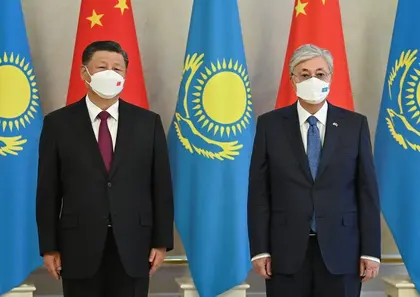China’s President Xi Jinping was in ex-Soviet Kazakhstan on Wednesday, sep. 14, on his first trip abroad since the early days of the coronavirus pandemic, ahead of a meeting with Russian leader Vladimir Putin.
Their highly-anticipated meeting comes as Russia suffers serious setbacks in Ukraine, but China has stood firm in its support of Putin and their “no limits” friendship.
JOIN US ON TELEGRAM
Follow our coverage of the war on the @Kyivpost_official.
During a meeting with President Kassym-Jomart Tokayev, Xi vowed full support for Kazakhstan’s sovereignty at a time when the ex-Soviet Central Asian region has been spooked by Russia’s invasion of Ukraine.
“No matter how the international situation changes, we will continue to resolutely support Kazakhstan in protecting its independence, sovereignty and territorial integrity,” Xi said, according to a Kazakh government statement.
Beijing “firmly supports the reform measures President (Tokayev) has taken to maintain national stability and development, and firmly opposes any forces that interfere in Kazakhstan’s internal affairs,” Xi said.
Tokayev hailed Xi’s visit as a reunion of “historic importance”, saying the Chinese leader’s decision to visit Nur-Sultan first since the start of the pandemic was a sign of “high-level… mutual trust and cooperation”.
The ex-Soviet Central Asian region, which Russia sees as in its sphere of influence, is key to China’s Belt and Road Initiative (BRI), a trillion-dollar push to improve trade links across the globe by building landmark infrastructure.

Ukraine Says Russia Provides North Korean Troops Fake Russian Military IDs
Tokayev said Beijing and Nur-Sultan had “set an example” for cooperation within the huge BRI initiative and praised prospects for further cooperation.
Xi, during his three-day visit to Central Asia, is scheduled to attend a summit of Shanghai Cooperation Organisation (SCO) leaders in Uzbekistan, where he is expected to meet with Putin.
– ‘Mutual respect, fairness’ –
The SCO was established in 2001 as a political, economic and security organisation to rival Western institutions and the summit will bring together Xi, Putin, Tokayev, leaders from India, Pakistan and three more ex-Soviet Central Asian countries.
Xi wrote ahead of the visit that the group had “set a fine example of a new type of international relations featuring mutual respect, fairness, justice and win-win cooperation, and proved itself an important and constructive force”.
Those were comments echoed by the Kremlin’s foreign policy advisor Yuri Ushakov who told reporters in Moscow that the SCO members “stand for a just world order”.
“The SCO offers a real alternative to Western-centric organisations,” he added.
Ushakov said that among Putin’s meeting in Samarkand this week, his talks with Xi would be “of particular importance”, focusing on the conflict in Ukraine and Russia’s growing economic ties with China.
Xi, in an article for Chinese state media ahead of the trip, said Beijing was prepared to work with Kazakhstan to “deepen cooperation in law enforcement, security and defence”.
He said also China wanted to work with Kazakhstan on drug trafficking and transnational organised crime as well as what China calls the “three evils”.
China’s government has previously used the term — referring to terrorism, separatism and religious extremism — to talk about its crackdown Xinjiang, which borders Kazakhstan.
Beijing stands accused of detaining over one million Uyghurs and other Muslim minorities in Xinjiang, including some Kazakhs, under a years-long security campaign that the United States and some lawmakers in other Western countries have labelled a “genocide”.
China vociferously denies the allegations, saying its actions are aimed at combating terrorism.
In a separate article for Uzbek media, Xi pledged to “strengthen security cooperation and resolve risks and challenges” and said Uzbekistan had a “unique role to play in resolving the Afghanistan issue”, CCTV reported.
“The two sides must take a clear stand against any forces undermining the regional security situation,” CCTV reported Xi as writing.
You can also highlight the text and press Ctrl + Enter






